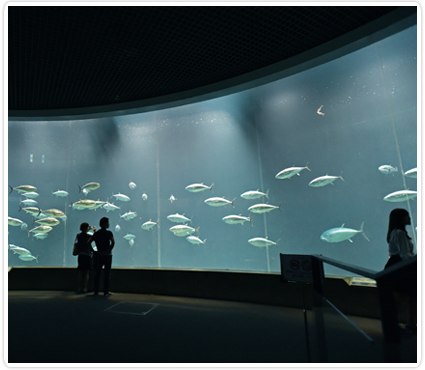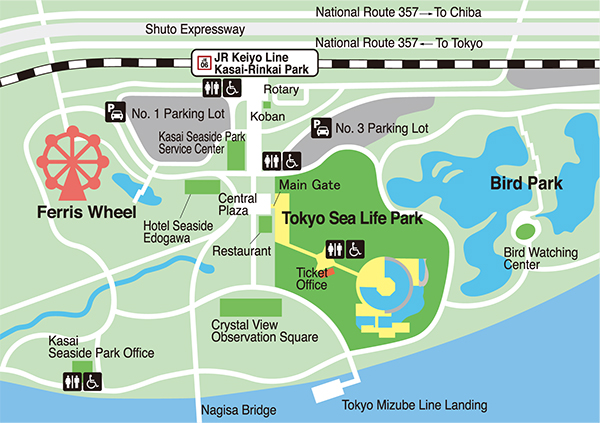


|
March 2026
|
||||||
| Sun | Mon | Tue | Wed | Thu | Fri | Sat |
| 1 | 2 | 3 | 4 × |
5 | 6 | 7 |
| 8 | 9 | 10 | 11 × |
12 | 13 | 14 |
| 15 | 16 | 17 | 18 × |
19 | 20 | 21 |
| 22 | 23 | 24 | 25 | 26 | 27 | 28 |
| 29 | 30 | 31 | ||||
×=Closed |
||||||
| Hours:9:30-17:00 | ||||||
Entrance and ticket office close 1 hour prior to closing time.


Open 9:30. to 17:00 (tickets sold until 16:00) and closes every Wednesday (closes Thursday if Wednesday is a public holiday).
*The aquarium closes from December 29 through January 1
| General Admission | Annual Passport | |
| Adults (16-64) | 700 yen | 2800 yen |
| Seniors (65+) | 350 yen | 1400 yen |
| Students (13-15) | 250 yen | ── |
| Children (0-12) | Free | ── |
*Free for junior high school students living in Tokyo or attending schools in Tokyo.
*Groups of 20 or more paying individuals are entitled to a 20% discount providing the group enters together through one entry at one time.
*Free admission for the disabled, and one assistant per disabled person.
*The admission is free on October 10 (The aquarium's Anniversary Day), May 4 (Greenery Day), and October 1 (Tokyo Citizens' Day).
We accept the following payment methods:
- Credit Cards (Visa, Mastercard, JCB, American Express, Diners Club, and Discover)
- e-money (Suica and all Suica-compatible IC transit cards)
- QR code payment (PayPay, Alipay, WeChatPay)
*Contactless payment and QR code payment is only available at staffed ticket windows.
*Please note that we are unable to recharge IC transit cards.

A gift shop and a restaurant.
We don't have parking lots. There are toll ones near the aquarium, but it is advised that you take trains on holidays and weekends.

A.The aquarium is located in the Kasai Rinkai Park, and easy to get from JR Kasai Rinkai Koen Station (5 minutes' walk), which is 15 minutes' ride from JR Tokyo Station by Keiyo Line.
B. If you take Subway Tozai Line, get off at Kasai Station or Nishi-Kasai Station, and take the bus to Kasai Rinkai Koen Station.
C. Tokyo Sea Life Park could be reached by Tokyo Mizube Line, which runs on Ara-kawa and Sumida Rivers. For further information, call 03-5608-8869.
D. Take the Wangan Expressway, exit at Kasai ramp, and follow the signs.
Address: |
Tokyo Sea Life Park, |
Phone: |
03-3869-5152 |
 The first aquarium in Japan was opened at Ueno Zoo in 1882 and there are now more than a hundred aquariums in the country. During the period, the facilites and capacity of aquariums have been enlarged and the purposes of display have been changing from just showcasing various fishes to presenting environments surrounding marine creatures.
The first aquarium in Japan was opened at Ueno Zoo in 1882 and there are now more than a hundred aquariums in the country. During the period, the facilites and capacity of aquariums have been enlarged and the purposes of display have been changing from just showcasing various fishes to presenting environments surrounding marine creatures.
 Tokyo Sea Life Park is not an exception. Its most important aim is reproducing aquatic habitats in Tokyo and in the world. In this light, we installed a huge donut-shaped tank (2,200t), where bluefin tunas swim around freely.
Tokyo Sea Life Park is not an exception. Its most important aim is reproducing aquatic habitats in Tokyo and in the world. In this light, we installed a huge donut-shaped tank (2,200t), where bluefin tunas swim around freely.
 The Seas of the World, Life of the Deep Sea, Life on the Shoreline, the Sea of Tokyo, and Life in Freshwater are some of the exhibit sections. We also collect marine life from the Arctic and Antarctic Oceans.
The Seas of the World, Life of the Deep Sea, Life on the Shoreline, the Sea of Tokyo, and Life in Freshwater are some of the exhibit sections. We also collect marine life from the Arctic and Antarctic Oceans.
 Fish and invertebrates are not the only life forms that inhabit the sea. At our aquarium, you can see penguins, auks, and puffins, typical sea birds which adapt well to marine habitats.
Fish and invertebrates are not the only life forms that inhabit the sea. At our aquarium, you can see penguins, auks, and puffins, typical sea birds which adapt well to marine habitats.
bluefin tuna, eastern little tuna, yellowfin tuna, scalloped hammerhead, eagle ray, etc.
humphead wrasse, bluespine unicornfish, shiner surfperch, pez chancho, picoroco, nursery fish, etc.
yellowband angelfish, sohal surgeonfish, leafy seadragon, golden butterflyfish, etc.
silver porgy, lumpsucker, roi des rouget, plaice, etc.
queen angelfish, rock beauty, blue chromis, butter hamlet, etc.
bulhead notothen, antarctic krill, arctic isopod, orage footed sea cucumber, etc.
long-stalked isocrinid sea lily, sea toad, spotted ratfish, slender alfonsino, etc.
purple star, sea bat, fan worm, striped shore crab, etc.
little penguins, Humboldt penguins and rockhopper penguins
giant kelp, copper rockfish, garibaldi, etc.
Water Bird Exhibition: tufted puffin, guillemot
file fish, striped mullet, mudskipper, yellow goby, bigfin reefsquid, yellowback fusilier, Clark's anemonefish, bluestreak cleaner wrasse, green moon wrasse, blenny, Japanese pygmy angelfish, etc.